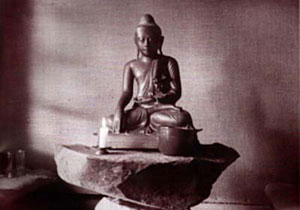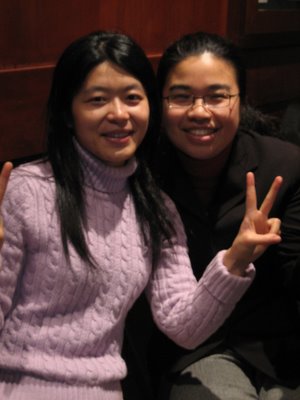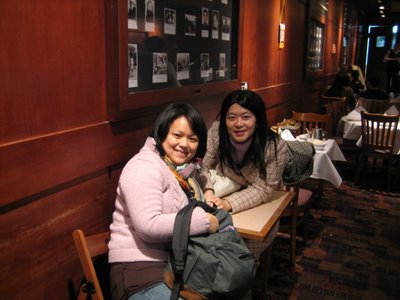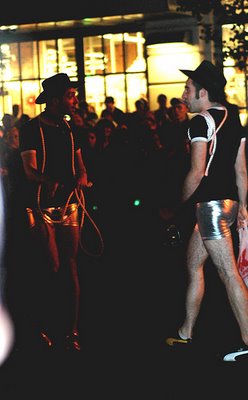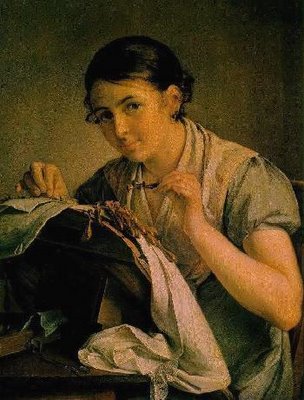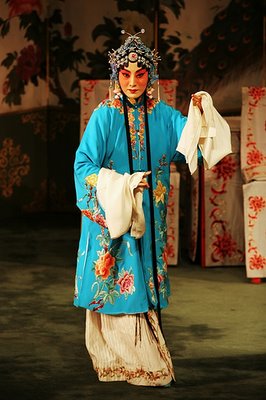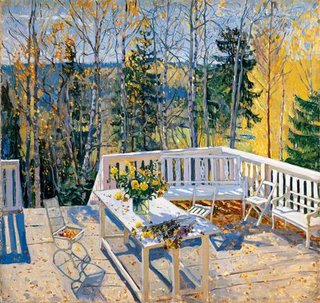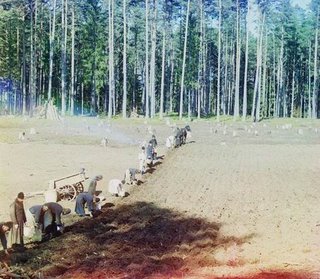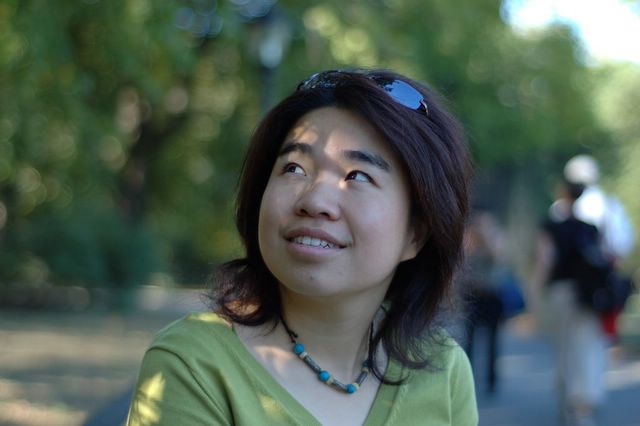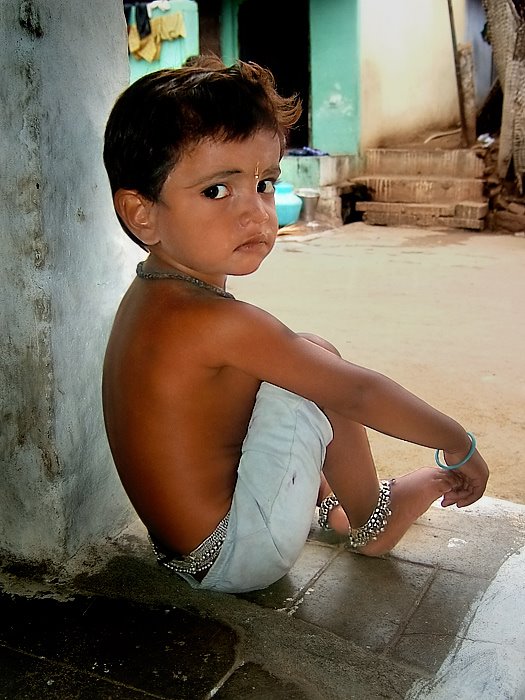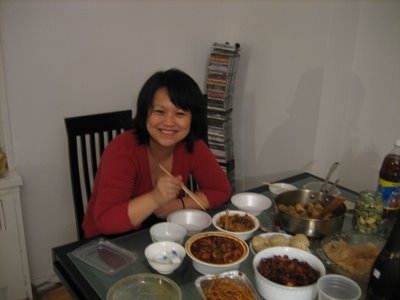
2006年11月19日星期日
2006年11月17日星期五
《锁麟囊》唱词辑录

Where the Truth Lies

2006年11月16日星期四
Il barbiere di Siviglia
 This November was not normal, the temparature stayed around 15 to 18 degrees and there was no sign of snowing whatsoever. The constant rain and warm weather really made me uneasy and I decided to go to see The Barber of Seville to smooth my feeling. Although I have booked a ticket for next March for this performance, but I really wish to see it now. It has became a critically acclaimed new production of Met for this season, which has not been performed for 25 years. Plus, it is refered to as a Divine Comedy, which I need most at this tricky point of my life.
According to Wikipedia: "The Barber of Seville (Il barbiere di Siviglia) is a comic opera in two acts by Gioacchino Rossini with a libretto (based on Beaumarchais's comedy Le Barbier de Séville) by Cesare Sterbini. This opera follows the first of the plays from the Figaro trilogy, by French playwright Pierre Augustin Caron de Beaumarchais. The original Beaumarchais version was first performed in 1775, in Paris at the Comédie Française at the Tuileries Palace."
This season at Met "the greatest Rossini tenor of our time, Juan Diego Flórez, sings the role of Count Almaviva in The Met’s first new Barbiere in 25 years. Diana Damrau and Joyce DiDonato share the role of Rosina, Peter Mattei is Figaro, Samuel Ramey is Don Basilio and John Del Carlo sings the role of the hapless Dr. Bartolo. Directed by Bartlett Sher and designed by Michael Yeargan (both of the Tony Award®-winning The Light in the Piazza), this is a Barbiere that is light on its feet, with mobile sets that allow the comic action to swirl from stage to audience and back again. Maurizio Benini conducts."
The amazing thing about this opera is that you know it is a comic, but it makes you laugh without any burden. Dr. Bartolo is certainly the hopeless laughstock of the story, however, his simple and stupic plots makes him even loveable. Peter Mattei's Figaro is very impressive, in terms of vocal part and his performance. I even think he could make a great Méphistophélès in Faust, even though he is a baritone, not a bass. The show-off of the play is Juan Diego Flórez, the Rossini tenor of our time. Flórez is a native of Peru and a son of folk musician. As for the title role he has played for 13 years, he commented: “You have to sing it fast!” says Juan Diego Flórez of Rossini’s quicksilver coloratura. “Otherwise, it’s not exciting." He points out that it’s not Rossini’s tricky fireworks that most appeal to him but rather the vocal elegance that underlies the crowd-pleasing display. “I like the refinement of it, the musicality of it,” he explains of Rossini’s vocal lines. “For me, Bach and Haydn and Mozart and Rossini are all part of the same style. The melody, the line—that’s very important for me.”
《塞韦利亚的理发师》总是让我联想到达里奥.福的《一个无政府主义者的意外死亡》。在《意外死亡》里,一切都是赤裸裸的,警察和被关押的无政府主义者的地位和关系一目了然。《塞》表面上是一出喜剧和爱情故事,但是其中充满了权力和反抗,包括男性和女性的冲突(Dr. Bartolo 和罗西娜),不同阶层之间的冲突(费加罗和Dr. Bartolo ),年轻和年老者的冲突 (Count Almaviva 和Dr. Bartolo )。但是这些权力关系潜藏在诙谐的表层之下,只有到了山穷水尽,故事无法继续的时候,Rossini 才不得不把个人的身份挑明,使冲突得到解决。故事的结果固然是皆大欢喜,其实也不过是拥有权力者的胜利。罗西那到底爱的是Count Almaviva 还是穷光蛋Lindoro,恐怕连她自己也不清楚。 哎,难得糊涂吧!
This November was not normal, the temparature stayed around 15 to 18 degrees and there was no sign of snowing whatsoever. The constant rain and warm weather really made me uneasy and I decided to go to see The Barber of Seville to smooth my feeling. Although I have booked a ticket for next March for this performance, but I really wish to see it now. It has became a critically acclaimed new production of Met for this season, which has not been performed for 25 years. Plus, it is refered to as a Divine Comedy, which I need most at this tricky point of my life.
According to Wikipedia: "The Barber of Seville (Il barbiere di Siviglia) is a comic opera in two acts by Gioacchino Rossini with a libretto (based on Beaumarchais's comedy Le Barbier de Séville) by Cesare Sterbini. This opera follows the first of the plays from the Figaro trilogy, by French playwright Pierre Augustin Caron de Beaumarchais. The original Beaumarchais version was first performed in 1775, in Paris at the Comédie Française at the Tuileries Palace."
This season at Met "the greatest Rossini tenor of our time, Juan Diego Flórez, sings the role of Count Almaviva in The Met’s first new Barbiere in 25 years. Diana Damrau and Joyce DiDonato share the role of Rosina, Peter Mattei is Figaro, Samuel Ramey is Don Basilio and John Del Carlo sings the role of the hapless Dr. Bartolo. Directed by Bartlett Sher and designed by Michael Yeargan (both of the Tony Award®-winning The Light in the Piazza), this is a Barbiere that is light on its feet, with mobile sets that allow the comic action to swirl from stage to audience and back again. Maurizio Benini conducts."
The amazing thing about this opera is that you know it is a comic, but it makes you laugh without any burden. Dr. Bartolo is certainly the hopeless laughstock of the story, however, his simple and stupic plots makes him even loveable. Peter Mattei's Figaro is very impressive, in terms of vocal part and his performance. I even think he could make a great Méphistophélès in Faust, even though he is a baritone, not a bass. The show-off of the play is Juan Diego Flórez, the Rossini tenor of our time. Flórez is a native of Peru and a son of folk musician. As for the title role he has played for 13 years, he commented: “You have to sing it fast!” says Juan Diego Flórez of Rossini’s quicksilver coloratura. “Otherwise, it’s not exciting." He points out that it’s not Rossini’s tricky fireworks that most appeal to him but rather the vocal elegance that underlies the crowd-pleasing display. “I like the refinement of it, the musicality of it,” he explains of Rossini’s vocal lines. “For me, Bach and Haydn and Mozart and Rossini are all part of the same style. The melody, the line—that’s very important for me.”
《塞韦利亚的理发师》总是让我联想到达里奥.福的《一个无政府主义者的意外死亡》。在《意外死亡》里,一切都是赤裸裸的,警察和被关押的无政府主义者的地位和关系一目了然。《塞》表面上是一出喜剧和爱情故事,但是其中充满了权力和反抗,包括男性和女性的冲突(Dr. Bartolo 和罗西娜),不同阶层之间的冲突(费加罗和Dr. Bartolo ),年轻和年老者的冲突 (Count Almaviva 和Dr. Bartolo )。但是这些权力关系潜藏在诙谐的表层之下,只有到了山穷水尽,故事无法继续的时候,Rossini 才不得不把个人的身份挑明,使冲突得到解决。故事的结果固然是皆大欢喜,其实也不过是拥有权力者的胜利。罗西那到底爱的是Count Almaviva 还是穷光蛋Lindoro,恐怕连她自己也不清楚。 哎,难得糊涂吧!
2006年11月14日星期二
珍惜生命,远离韩剧
2006年11月12日星期日
谭盾 from Columbia with love

2006年11月11日星期六
我是小马想过河
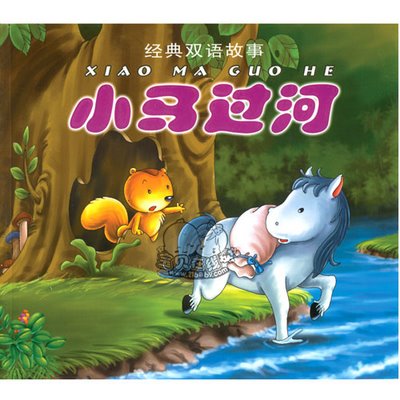
选自《狐狸啊,你干啥呢》
2006年11月9日星期四
Madam Butterfly
 I went to see Madam Butterfly at Met Opera. It is a new co-production between The Metropolitan Opera, English National Opera and the Lithuanian National Opera. "Stage and film director Anthony Minghella (The English Patient) presents Butterfly as a Japanese play, complete with Bunraku-style puppets (by Blind Summit Theatre) and translucent Shoji screens designed by Michael Levine. Han Feng’s costumes are a riot of color and Carolyn Choa’s choreography explores the boundaries between East and West" (http://www.metoperafamily.org/metopera/season/production.aspx?id=8881).
I went to see Madam Butterfly at Met Opera. It is a new co-production between The Metropolitan Opera, English National Opera and the Lithuanian National Opera. "Stage and film director Anthony Minghella (The English Patient) presents Butterfly as a Japanese play, complete with Bunraku-style puppets (by Blind Summit Theatre) and translucent Shoji screens designed by Michael Levine. Han Feng’s costumes are a riot of color and Carolyn Choa’s choreography explores the boundaries between East and West" (http://www.metoperafamily.org/metopera/season/production.aspx?id=8881).

According to wikipedia: "Madama Butterfly (Madame Butterfly) is an opera in three acts (originally two acts) by Giacomo Puccini to an Italian libretto by Luigi Illica and Giuseppe Giacosa. The opera was based on a short story by John Luther Long which was made into a play by David Belasco. " The story is said to focus the conflict of culture, the western and eastern values and the idea of love. Butterfly is portraited as an innoscent womon who put love above her respect for her religion and tradition. There are several occasions she refuses to refer herself as Japanese, but eventually she is abondended as a Japanese wife. The play is created 100 years ago and it speaks to the process of globalization and global conflicts accompany the process. Butterfly's contradictory feelings about her American husband represent the feelings of most developing countries for the developed countries. It is not only about a woman's fate who falls in love with western culture, it is also about a nation's fate when it encounters a powerful external culture. I think the most extraordinary part of the opera is its stage design and use of the traditional Japanese theatrical techniques and way of performance, such as Bunraku-style puppets and dancers as floating instrument. In the end of the first act, Butterfly and Pinkerton sang a duet in the garden. But on stage, there is no garden. The group of dancers hold paper latterns instead, moving back and forth to create this invisible garden on the stage. The moving of the latterns creates an illusion of river of stars on the sky and the changing emotions of the loving couple. In the start of the last act, the dancers appears. One of them wears Pinkerton's jacket and he plays the Pinkerton in Butterfly's dream. In her dream, Pinkerton returns from abroad and finds his son in such a joy. The silent dance sequence is very beautiful and the performer actually dances with the puppet which represents Butterfly's son ("today his name is sorrow; but tomorrow his name is joy"). When Butterfly decides to die, the stage becomes dark and she is wearing her wedding gown. After she stabs herself, two dancers come in and pull the red silk belt on her back. The red belt becomes streams of blood all over the stage. I can not help crying, it is just too much! Madam Butterfly is a much simple work than Aida. But because of its simplicity, it provides the artists a lot of space to put into their ideas. The stage design, the light design, and the Choreographer are perfectly put together--not to take you away from the opera, but to make it a holistic work. The opera almost generates the same feeling as achieved by many of great traditional Japanese poetry--a sad happiness in a floating world. BTW, 我们在大都会歌剧院门口看到了张艺谋。身穿黑衣,缠着两圈儿红围脖,跟一般来看戏的老百姓一样。中国的名人到了纽约活得真自在,难怪都爱来这儿呢。
逃会

2006年11月8日星期三
Ching Ching Cha

 mprimising its idea. Maybe that is one of amazing thing about belief!
mprimising its idea. Maybe that is one of amazing thing about belief! 2006年10月30日星期一
Literature and Citizenship: A Conversation with Arthur Danto and Orhan Pamuk
"Literature and Citizenship" is part of the Havel at Columbia program sponsored by the Columbia University Arts Initiative.
Arthur Danto is Johnsonian Professor Emeritus Philosopy at Columbia University. Professor Danto has been with Columbia since 1951, a professor since 1966. He has been the recipient of many fellowships and grants including two Guggenheims, ACLS, and Fulbright. Professor Danto has served as Vice-President and President of the American Philosophical Association, as well as President of the American Society for Aesthetics. He is the author of numerous books, including Nietzsche as Philosopher, Mysticism and Morality, The Transfiguration of the Commonplace, Narration and Knowledge, Connections to the World: The Basic Concepts of Philosophy, and Encounters and Reflections: Art in the Historical Present, a collection of art criticism which won the National Book Critics Circle Prize for Criticism, 1990. His most recent book is Embodied Meanings: Critical Essays and Aesthetic Meditations. Art critic for The Nation, he has also published numerous articles in other journals. In addition, he is an editor of the Journal of Philosophy and consulting editor for various other publications.
Orhan Pamuk, the internationally acclaimed Turkish novelist and memoirist, won the 2006 Nobel Prize for Literature.
Mr. Pamuk is a Fellow with Columbia University’s Committee on Global Thought and will hold an appointment in Middle East and Asian Languages and Cultures and at the School of the Arts. His work has been translated into more than 40 languages and he has received numerous prestigious international prizes, including Le Prix Mediterranee etranger, the Prix Medicis, the Ricarda Huch Prize, and honorary membership in the American Academy of Arts and Letters. A native of Istanbul, Mr. Pamuk was also a visiting scholar at Columbia University from 1985 to 1988.
| Date: | Thursday, November 2nd, 7:30 p.m. |
| Location: | Miller Theater |
| Contact: | Members of the Press who wish to attend this event should contact Anne Burt at 212-854-7884 or ab2673@columbia.edu |
| Reservations: | Tickets are free but reservations are required: http://havel.columbia.edu/literature.html |
2006年10月29日星期日
Haunted House
2006年10月28日星期六
去时陌上花如锦,今朝楼头柳又青
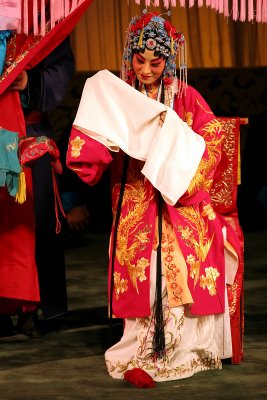
世界,人,思绪,一言以蔽之:乱!(北大未名)
亲爱的长腿叔叔,你睡了吗?
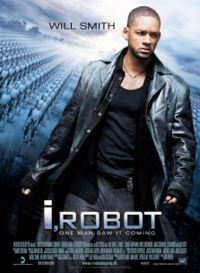
Holy Madness and Halloween Extravaganza
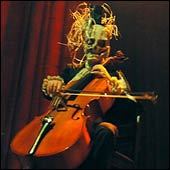
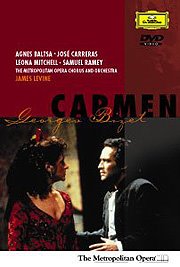
2006年10月27日星期五
Gilda or Anna
 This season, Met Opera has a new production of Rigoletto and I went yesterday for its season premier. Met is famous for Enrico Caruso’s version of Rigoletto where he played the Duke of Mantua. In this season, Met introduces a new conductor Friedrich Haider and Juan Pons plays the Jester and Joseph Calleja has his debute as the Duke. As usual, the splendid night at Met always makes me nervous. However, I am luck enough to have two queers as my neighbors and their non-stopping talking made the intermissions bearable. Yesterday New Jersey court just announced same-sex couple would enjoy the same right as hetero-sex couple, and CNN took it as breaking news. This was certainly a side point.
I had some ideas about the storyline and the program notes gave detailed description of the production of the original opera. The story by Verdi was adopted from Victor Hugo’s play. As it was suggested, Verdi was more of a humanistic in nature while Hugo openly criticized the class structure. So Verdi’s adaptation changed the location and names of the play, but kept the major storyline and the core theme of the play—the curse upon the jester, who was cold and cruel outside but very compassionate inside.
According to wikipedia:
“ Rigoletto is an opera in three acts by Giuseppe Verdi. The Italian libretto was written by Francesco Maria Piave based on the play Le roi s'amuse by Victor Hugo. It was first performed at La Fenice in Venice on March 11, 1851. According to Opera America, Rigoletto is now North America's ninth most performed opera.”
A hit from start, Rigoletto was a tragedy full of tension. The double role of Rigoletto as a loving father and as a “fool” in the court gradually leads to his ruins. The Duke is portrayed as a womanizer who never takes women or love seriously. However, in the very process of pursuing Gilda, Rigoletto’s beautiful daughter, he finds his real compassion. Once he finds Gilda is abducted from Rigoletto’s house, he regrets he lose the only chance in his life that might have convert him into a honest man for love. Ekaterina Siurina gave a wonderful performance as Gilda, the innocent mind full of love. The structure of the play is simple, a story of a dishonored father who seeks just revenge but fails. However, Verdi and Piave (who wrote the libretto) refused to give their figures a simple identity but rather put them into dilemma—who were both victims and criminals. Rigoletto participated the Duke’s conspiracy of wooing other women and his own daughter was disgraced by the Duke. The Duke could have the chance to start a meaningful life because of his love for Gilda, however, he gave it up for his lust for her body. Gilda was guilty of blind love for the Duke and was suffered when she observed the Duke seduced Maddalena.
The trick of the play is not only the curse of Count Monterone whose daughter the Duke had dishonoured, but also the issue of identity. Gilda constantly asked her father about the real family name and history of her family, about her mother, and who her father really was. Rigoletto refused to answer and could not answer. He was suffering because of his fate as a humpback and a ruthless entertainer in Duke’s court. He was a man without name. The Duke who disguised himself before Gilda was also a man without real identity. He flirted and chased the skirts without knowing his own purpose. His love was shallow and superficial because his love was without a cause.
In the end of the play, Gilda decided to sacrificed herself for the life of the Duke, her lover. Rigoletto could not bear the pain of losing his daughter and lamented “the curse!” by her body. I can not help thinking about another movie, Immortality, directed by Po-Chih Leong. In the film, Jude Law played a ruthless vampire who took women’s love and life. He falled in love with Anna and he believed her perfect love for him would save him from the fate of vampire. The most touching scene for me was the morning after they get up, Steven (jude law) started a portrait for Anne with one hand and wrote a love poetry for her with other hand. Nevertheless, when the moment of truth came, Steven decided to kill Anne to save his own life. Anne refused to sacrifice herself for his sake and she tried to kill herself rather than being killed by Steven. Steven gave it up in the end and died in his own chamber. Before he died, he finally found peace in his mind and he did not have to worry about how to survive anymore. In his last breathe, he found the pleasure of letting go.
Gilda and Anne make different choice and the men they loved are evil. Maybe it is because the time is changed and our values change as well. Will you choose to play Gilda or Anne when you meet your evil man?
This season, Met Opera has a new production of Rigoletto and I went yesterday for its season premier. Met is famous for Enrico Caruso’s version of Rigoletto where he played the Duke of Mantua. In this season, Met introduces a new conductor Friedrich Haider and Juan Pons plays the Jester and Joseph Calleja has his debute as the Duke. As usual, the splendid night at Met always makes me nervous. However, I am luck enough to have two queers as my neighbors and their non-stopping talking made the intermissions bearable. Yesterday New Jersey court just announced same-sex couple would enjoy the same right as hetero-sex couple, and CNN took it as breaking news. This was certainly a side point.
I had some ideas about the storyline and the program notes gave detailed description of the production of the original opera. The story by Verdi was adopted from Victor Hugo’s play. As it was suggested, Verdi was more of a humanistic in nature while Hugo openly criticized the class structure. So Verdi’s adaptation changed the location and names of the play, but kept the major storyline and the core theme of the play—the curse upon the jester, who was cold and cruel outside but very compassionate inside.
According to wikipedia:
“ Rigoletto is an opera in three acts by Giuseppe Verdi. The Italian libretto was written by Francesco Maria Piave based on the play Le roi s'amuse by Victor Hugo. It was first performed at La Fenice in Venice on March 11, 1851. According to Opera America, Rigoletto is now North America's ninth most performed opera.”
A hit from start, Rigoletto was a tragedy full of tension. The double role of Rigoletto as a loving father and as a “fool” in the court gradually leads to his ruins. The Duke is portrayed as a womanizer who never takes women or love seriously. However, in the very process of pursuing Gilda, Rigoletto’s beautiful daughter, he finds his real compassion. Once he finds Gilda is abducted from Rigoletto’s house, he regrets he lose the only chance in his life that might have convert him into a honest man for love. Ekaterina Siurina gave a wonderful performance as Gilda, the innocent mind full of love. The structure of the play is simple, a story of a dishonored father who seeks just revenge but fails. However, Verdi and Piave (who wrote the libretto) refused to give their figures a simple identity but rather put them into dilemma—who were both victims and criminals. Rigoletto participated the Duke’s conspiracy of wooing other women and his own daughter was disgraced by the Duke. The Duke could have the chance to start a meaningful life because of his love for Gilda, however, he gave it up for his lust for her body. Gilda was guilty of blind love for the Duke and was suffered when she observed the Duke seduced Maddalena.
The trick of the play is not only the curse of Count Monterone whose daughter the Duke had dishonoured, but also the issue of identity. Gilda constantly asked her father about the real family name and history of her family, about her mother, and who her father really was. Rigoletto refused to answer and could not answer. He was suffering because of his fate as a humpback and a ruthless entertainer in Duke’s court. He was a man without name. The Duke who disguised himself before Gilda was also a man without real identity. He flirted and chased the skirts without knowing his own purpose. His love was shallow and superficial because his love was without a cause.
In the end of the play, Gilda decided to sacrificed herself for the life of the Duke, her lover. Rigoletto could not bear the pain of losing his daughter and lamented “the curse!” by her body. I can not help thinking about another movie, Immortality, directed by Po-Chih Leong. In the film, Jude Law played a ruthless vampire who took women’s love and life. He falled in love with Anna and he believed her perfect love for him would save him from the fate of vampire. The most touching scene for me was the morning after they get up, Steven (jude law) started a portrait for Anne with one hand and wrote a love poetry for her with other hand. Nevertheless, when the moment of truth came, Steven decided to kill Anne to save his own life. Anne refused to sacrifice herself for his sake and she tried to kill herself rather than being killed by Steven. Steven gave it up in the end and died in his own chamber. Before he died, he finally found peace in his mind and he did not have to worry about how to survive anymore. In his last breathe, he found the pleasure of letting go.
Gilda and Anne make different choice and the men they loved are evil. Maybe it is because the time is changed and our values change as well. Will you choose to play Gilda or Anne when you meet your evil man?
2006年10月25日星期三
Match Point
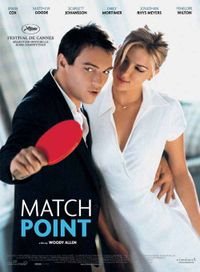
Wikipedia introduction about Match Point (2005, Woody Allan)
"The story is a fable about the role that luck plays in determining everyone's destiny. As protagonist Chris Wilton notes in an opening voice-over: The man who said "I'd rather be lucky than good" saw deeply into life. People are afraid to face how great a part of life is dependent on luck. It's scary to think so much is out of one's control. There are moments in a match when the ball hits the top of the net and for a split second it can either go forward or fall back. With a little luck it goes forward and you win. Or maybe it doesn't and you lose.
Structural and thematic similarities exist between the movie and two novels, Dreiser's An American Tragedy and Dostoevsky's Crime and Punishment. The movie also bears notable similarities in plot and theme to a previous movie of Allen's, Crimes and Misdemeanors. Perhaps the most influence stems from the 1964 Truffaut film The Soft Skin, in which a married man also has an affair that ends up in shotgun related murder.
The film's plot mirrors the novel An American Tragedy and the film A Place in the Sun, which also involve a poor man who, through the possibility of marriage to a wealthy woman, resorts to murdering a poor pregnant girlfriend in order to preserve his chances at a new life of wealth and privilege.
Opera connoisseurs have noted that the arias and opera extracts make an ironic commentary on the actions of the characters and sometimes foreshadow developments in the movie's narrative. The Caruso arias are intercut with extracts from contemporary performances which the characters attend over the course of the film. There are scenes at the Royal Opera House and elsewhere performed by opera singers, accompanied by a piano and not, as is usual, by an orchestra. Arias and extracts include work by Verdi (in particular Otello and Rigoletto), Donizetti's L'elisir d'amore, Bizet's Les pêcheurs de perles, Carlos Gomes' Salvatore Rosa and Gioachino Rossini's Guillaume Tell. "
If I only allow to use three words to describe this film, they will be: luck, lust and lost. It is a typical Woody Allan film, although it immediately reminds me about Montgomery Clift's A Place in the Sun (1955). I love Montgomery Clift's performance in that classic tragedy of social climber: he played a role tortured by ambition and tried to find aim of his life. Clift himself is a tragic figure in his off-screen life and his life had been described as a life-long pursuing of suicide. The darkside of his mind made him a perfect actor. In comparision, Jonathan Rhys-Meyers is a different type of actor. He wins his fame as independent film actor early in his life and his unforgettable role in Velvet Goldmine (1998) makes him a symble of fatal pop star. He also acts in some not decent films, such as Mission Impossible III. He is not afraid to show his sensitivity and vulnerable in moives, but his weakness makes him a more convincing character.
Match Point resembles the Closer in some respect. In both films, individuals try to find relationship which could satisfy both their body and mind and fail both ways. In Closer, Jude Law played this sick writer who could have win his true love but took a shortcut and ruined the whole thing. In Match Point, Chris (by Jonathan Rhys-Meyers) would have the option of not marrying Cholye and choose Noah, but he could not afford to lose the quality of life his marriage to Cholye conveyed. What differs in the two films is that in Closer, the film investigates the minds of males and females in the relationship; but in Match Point, we only observe Chris's mind. On the surface, the film emphasizes the importance of luck in individual's life; but the underlying theme is the unavoidable lust which pushes people ahead.
2006年10月23日星期一
一生做一次孤儿--艾柯
长腿叔叔
2006年10月22日星期日
Shopping for good news
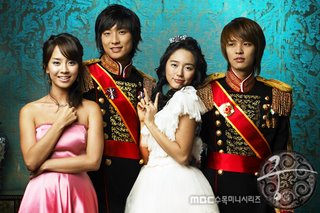
Come Back
